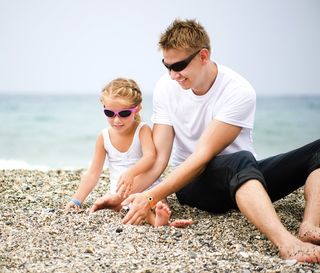
From paper towel commercials to PTA meetings, let's face it: Moms are assumed to be the default parents.
But that is an increasingly outdated notion that doesn't reflect reality. Fathers are becoming more and more engaged with their children's lives; American dads today spend nearly 7.5 hours a week with their children, triple the 2.5 hours a week they spent with their offspring in 1965, according to a 2011 Pew Research Report. And nearly half of those dads wish they could spend even more time with the kids.
That may be a particularly good thing. Fathers tend to differ from mothers in their parenting styles, and though it's not a competition, there are several things that dads do better. From roughhousing to side-by-side activities, here are six arenas in which dads excel. [Fathers Know Best: History's 12 Most Doting Dads]
1. Playing rough
Several decades of research suggest that dads are more likely to roughhouse than moms.
"As long as there is the caveat that these are generalizations, a lot of dads have a special strength in physical play, rough-and-tumble play," said Larry Cohen, a psychologist in Boston and author of "Playful Parenting" (Ballantine Books, 2002).
Roughhousing can be especially helpful in the teen years, when most youngsters get the message that there are only two types of touch: aggressive and sexual. Tickling or pillow fights can teach children that there is a whole world of touch that doesn't fit into either category, but is friendly, affectionate and playful.
Sign up for the Live Science daily newsletter now
Get the world’s most fascinating discoveries delivered straight to your inbox.
In addition, oxytocin, the cuddle chemical that is released when moms nurse their babies, is also released when parents engage in roughhousing with their kids, Cohen said.
2. Relax, man
While there are certainly overprotective, "helicopter" dads and laid-back moms, men tend to be more relaxed in their parenting style, Cohen said.
"I had a [male] friend who would say to their kids, 'Don't call me unless someone's bleeding,'" Cohen said.
Helicopter parenting can undermine a kid's sense of competence and confidence, Cohen said. Men typically have more tolerance for messes and scrapes and are more willing to let their children pick themselves back up, building the kids' sense of confidence and resilience.
3. Shoulder-to-shoulder
Men tend to engage in more shoulder-to-shoulder activities with their children. That may mean seeing a movie together, working side-by-side on a crafts project or going on a hike.
Moms tend to operate in face-to-face ways, which builds emotional intimacy. But dads are experts at teaching kids that they've got someone in their corner.
"Shoulder-to-shoulder helps build competence and confidence, and it's really because someone's in there with you, doing things with you," Cohen said.
4. They appreciate it more
Fathers may also get more out of their roles as parents, according to a 2013 study in the journal Psychological Science. In several studies, fathers report experiencing more meaning, happiness and positive emotions in their lives than single women and men. Mothers didn't show quite the same boost in happiness. (The authors suggest this may be because moms feel more stress from childcare and housework than dads do.)
5. Love matters
Though it's critical for both moms and dads to provide warmth and love, Dad's acceptance may be the most important, according to a 2012 study in the journal Personality and Social Psychology Review.
"Knowing that kids feel loved by their father is a better predictor of young adults' sense of well-being, of happiness, of life satisfaction than knowing about the extent to which they feel loved by their mothers," study co-author Ronald Rohner told LiveScience.
6. Maternal myths
Still, the notion that moms are better than dads dies hard. Some of that may be due to the perception that women come prewired with a maternal instinct that men just can't match. But that idea is also being dismantled.
For instance, in a 2013 study in the journal Nature Communications, researchers found that dads are just as good as moms at identifying their babies' cries — provided the fathers spend the same amount of time with their children as the mothers do.
And new dads show increased levels of the love hormone oxytocin in the weeks after their children's birth, according to a 2010 study in the journal Biological Psychiatry.
All these studies suggest that modern portrayals of parents could use an update. Instead of showing moms cleaning up after a bumbling father, commercials could be truer to life by showing dads who teach their kids to clean up their own messes.
Follow Tia Ghose on Twitter and Google+. Follow LiveScience @livescience, Facebook & Google+. Original article on LiveScience.com.

Tia is the managing editor and was previously a senior writer for Live Science. Her work has appeared in Scientific American, Wired.com and other outlets. She holds a master's degree in bioengineering from the University of Washington, a graduate certificate in science writing from UC Santa Cruz and a bachelor's degree in mechanical engineering from the University of Texas at Austin. Tia was part of a team at the Milwaukee Journal Sentinel that published the Empty Cradles series on preterm births, which won multiple awards, including the 2012 Casey Medal for Meritorious Journalism.
Most Popular


